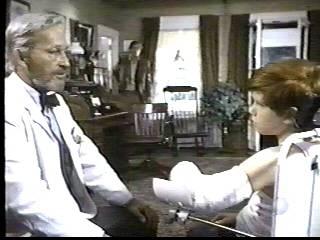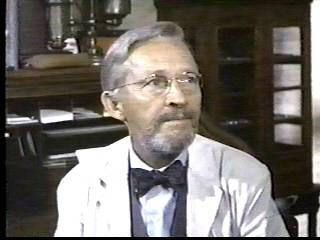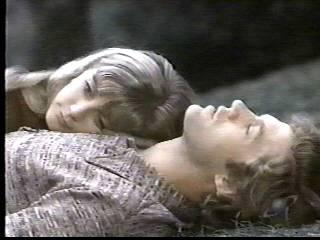
|
|
|
|
|
|
|
|
|
|
|
|
|
(1971) Director: Ted
Post
I'm not that fond of made-for-TV movies made after the early 1980s, for several reasons. For some reason or another (maybe due to rising costs), more modern made-for-TV movies have a cheap feel to them, unlike earlier made-for-TV movies, which often had production values equal to the theatrical movies of the time. Also, modern made-for-TV movies has an annoying glossy look to them that looks unreal; glossy can be fine, but give me a little real-life grit in there to make it look as real life does, just like those older made-for-TV movies. The third reason is that the range of subject matter found in modern made-for-TV movies is very limited. If you take a look, for the most part you'll see dramas based on real-life incidents that everyone is sick about hearing by the time filming of whatever particular dramatization is completed, and have the insight of one of those quickie non-fiction paperbacks you keep seeing on drugstore bookshelves. Or else, sugary and politically-correct dramas (often set in the past) that are aimed at family audiences. Compare the made-for-TV movies of today with those of
the past. Sure, you will find the occasional clunker, such as the goofy
Pray For The Wildcats; you can't really
expect a movie that brings together Andy Griffith, Robert Reed, and
William Shatner (and placing them on motorbikes) to be of Another difference that might possibly make network executives reluctant is that the source of Dr. Cook's Garden comes not from real life or a well-known franchise. It's an adaptation of a stage play originally written by Ira Levin, the playwright/novelist behind well-known works like Rosemary's Baby, The Stepford Wives, and Deathtrap. Its small-town setting and a central character having a secret murderous agenda are elements you can find in these and others of his works. In this case, the setting is Greenfield, another small town somewhere in the heartland where life is perfect for all its citizens, where for the longest time there has been no crime and even no overbearing citizens - at least, overbearing citizens that hung around for a long time. The most beloved citizen of the small town is Leonard Cook (Crosby), the hard-working town doctor who even in his advanced age goes all-out for the citizens, from making house calls to help the town council get a new school built for the children. Former resident of the town Jim (played by soap opera star Frank Converse), who has recently graduated from medical school, one day returns to see his old mentor, and after so many years away he is especially struck by the town's transformation into a kind of paradise. However, he is also struck by some peculiar things the in-heaven citizens seem blind to - such as the fact that all Greenfield's "problem" citizens for the past few years have died from various ailments, and that the doctor has mysteriously marked all their files with the letter "R". As well, just days earlier the one person who did bring up these mysterious deaths to the doctor happened to die from a heart attack the subsequent day. It's pretty easy to figure out what is going on long
before Jim gets some substantial evidence on his hands. Still, I wish
they had at least tried to throw in even just a little bit of
doubt, so that in the back of our minds we might be thinking that
maybe, just maybe, there will be something we haven't counted on.
However, It is disappointing that Dr. Cook's Garden leads not only to such a predictable conclusion, but one that is so drastically different in tone from what lead up to it, suddenly switching from a deep dark mystery feel to something that's almost right out of a brainless Steven Seagal actioner. Even if the eventual and inevitable fate of the doctor had been the same, I wouldn't have minded so much had they at least lead up to this in a more cerebral and realistic manner. If you, however, are willing to forgive the movie for letting out those spoilers so early in the game, it's likely that you will find what's between the opening and the closing reasonably engaging. The big mystery that's hiding in this town is undeniably not a surprise (considering that syringe is shown), but though the story may be lacking in real surprises, it is otherwise told with enough professionalism to make it still worth a look. For starters, the movie (without commercials) only runs for 75 minutes. While that may seem like a short running time, for this particular story the compact length is actually an advantage. Except for a few minutes of sappiness concerning Jim making a few sparks when he's reunited with Jane (Danner, seen recently in Meet The Parents), his hometown sweetie (a beginning subplot which is fortunately dropped for the rest of the movie), there is absolutely no waste of time. Every scene has a purpose, and advances the story as much as it should do, and no more - and no less, for that matter. It goes to show that you don't always get more for your money with a longer running time. Though it is not a big surprise just what is secretly
happening in Greenfield, what Dr. Cook has been working on all of these
years still manages to have some impact, and doesn't lose its
disturbing trait despite that we figure the big mystery early on. For
one thing, Dr. Cook actions are extremely believable, something that
could happen (and has happened) many places in the real world - the big
mystery does not involve something outlandish like It's the best scene in the movie, though it should be pointed out that its success is not completely due to the script. The key element that makes the sequence work as well as it does, as well as adding an extra element of believability to the entire premise of the movie, is with Crosby cast as the doctor. While it may seem at first a bizarre choice to cast an actor who played such a lovable crooner for much of his career as someone with a murderous agenda, this unconventional casting actually ends up working for the movie in its favor. When we see Dr. Cook interacting with Greenfield's citizens in his office, or in church and picnics, he is so sweet, so kindly to everyone, that it's an effective shock to realize that this man can be so caring while actively committing countless felonies. It would be less of an impact had someone like Vincent Price played the role - you can sense evil by just looking at Price, and it would make you wonder why no one else in the town could sense it as well. Crosby is not just a good choice to playing the warm-hearted senior citizen side of Dr. Cook, he also does well when Cook cannot help but talk about his crimes. Crosby doesn't play it for camp, instead portraying Dr. Cook's darkness with a twisted logic, one that the character has had a lot of time to think about, and even admits troubles him at times. His relative calmness about what he's done - and is determined to continue doing - is more creepily convincing that how it would sound coming out of a raving lunatic. The production values are solid, making Dr. Cook's Garden look strong enough to be considered a movie and not simply as a made-for-TV movie. Though its story may be painfully predictable, the issues involved are handled with enough insight and intelligence that the script could be considered a screenplay and not the looked-down-upon term "teleplay". It's odd that Dr. Cook's Garden, plus other equally worthy made-for-TV movies made during the "golden age", are seldom aired anywhere anymore, even on channels that will freely show theatrical movies from the same era, while the more recent made-for-TV movies get more exposure despite their generally horrendous quality. It makes me wish at times that TV and cable networks had doctors of their own. Check
for availability on Amazon. See also: An Enemy Of The People, Psychopath, Sunday In The Country |
 high quality. But
looking beyond such failures, one will not only see a number of movies
that are genuinely good, but cover a wide range of genres. There are
the serious dramas (Brian's Song, That Certain Summer),
but there are also the goofy comedies (
high quality. But
looking beyond such failures, one will not only see a number of movies
that are genuinely good, but cover a wide range of genres. There are
the serious dramas (Brian's Song, That Certain Summer),
but there are also the goofy comedies ( the fact that in the
first few minutes Dr. Cook pulls out a sinister-looking syringe when he
is alone with the suddenly ill person who had noticed the deaths the
previous day - and we then immediately cut to a new scene where the ill
person has been dead for a few minutes - well, this kind of spoils the
game a little for the audience. It also doesn't help that just before
Dr. Cook gets to the ill patient's house, we see a short sequences
where he grab his chest in pain, and struggles to take a heart pill;
upon seeing that, I think it's safe to say almost anyone watching will
immediately guess what, more or less, will happen to Dr. Cook at the
end of the movie. And from that guess, they will be able to confidently
conclude that just before the expected happens to Dr. Cook, he will be
involved in some kind of big struggle with someone else, one on such a
grand scale that it will involve an extremely unconvincing stunt double
substituting for Crosby for all the shots involving the doctor doing
all of this rolling around and using improvisational weapons.
the fact that in the
first few minutes Dr. Cook pulls out a sinister-looking syringe when he
is alone with the suddenly ill person who had noticed the deaths the
previous day - and we then immediately cut to a new scene where the ill
person has been dead for a few minutes - well, this kind of spoils the
game a little for the audience. It also doesn't help that just before
Dr. Cook gets to the ill patient's house, we see a short sequences
where he grab his chest in pain, and struggles to take a heart pill;
upon seeing that, I think it's safe to say almost anyone watching will
immediately guess what, more or less, will happen to Dr. Cook at the
end of the movie. And from that guess, they will be able to confidently
conclude that just before the expected happens to Dr. Cook, he will be
involved in some kind of big struggle with someone else, one on such a
grand scale that it will involve an extremely unconvincing stunt double
substituting for Crosby for all the shots involving the doctor doing
all of this rolling around and using improvisational weapons. androids or Nazi
cloners that take the story into the realms of science fiction. To
further the believability of Dr. Cook's plans, the movie manages to
cleverly sneak into the narrative a number of plausible explanations as
to why Dr. Cook has gotten away with his evil deeds for so long (for
example, it's revealed there are no coroners in small towns like
Greenfield.) Another way that the movie holds a feeling of uneasiness
over its viewers is that it refuses to present what Dr. Cook is doing
in a typical black-and-white viewpoint - it won't ease the viewer by
portraying Dr. Cook's deeds as completely evil and wrong. Every so
often, something related to what Dr. Cook did comes across in a
positive light, something that forces us to think, "Is what Dr. Cook
doing completely bad - or so bad at all?" There are no easy
answers or viewpoints on display here, so much so that even when Jim
finally confronts Dr. Cook with all the evidence he's gathered
two-thirds into the movie, Dr. Cook manages to come up with a strong
counterpoint to everything Jim says - so much so, that at the end of
the confrontation, Jim himself just doesn't know what to do next - if
anything.
androids or Nazi
cloners that take the story into the realms of science fiction. To
further the believability of Dr. Cook's plans, the movie manages to
cleverly sneak into the narrative a number of plausible explanations as
to why Dr. Cook has gotten away with his evil deeds for so long (for
example, it's revealed there are no coroners in small towns like
Greenfield.) Another way that the movie holds a feeling of uneasiness
over its viewers is that it refuses to present what Dr. Cook is doing
in a typical black-and-white viewpoint - it won't ease the viewer by
portraying Dr. Cook's deeds as completely evil and wrong. Every so
often, something related to what Dr. Cook did comes across in a
positive light, something that forces us to think, "Is what Dr. Cook
doing completely bad - or so bad at all?" There are no easy
answers or viewpoints on display here, so much so that even when Jim
finally confronts Dr. Cook with all the evidence he's gathered
two-thirds into the movie, Dr. Cook manages to come up with a strong
counterpoint to everything Jim says - so much so, that at the end of
the confrontation, Jim himself just doesn't know what to do next - if
anything.